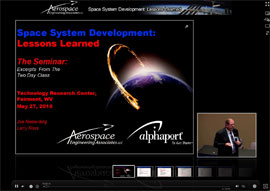Course Summary
Mission Success First: Lessons Learned
Duration
2 days (1 day and customized versions also available)
Course Summary
This course is designed to provide an insight into the causes of space system mishaps and near-misses. An examination of the history of such events reveals that the root causes remain largely unchanged over time and across many, diverse programs. Lessons to be learned from such root causes can help space systems designers to analyze the detailed case histories of previous mishaps to identify system-specific lessons, and translate these lessons into concrete strategies that will minimize or eliminate root causes.
Topics ranging from lessons in general management approaches to very detailed actual mishap case histories are presented. The instructors share their combined eighty plus years of experience in space system development, and personal involvement with many of the mishaps presented, to provide unique insights from the perspective of those who were there and have the scars to prove it. They identify all sources of information such as websites, failure reports, interviews, and consultation with other subject matter experts. Finally, they share their views on why the lessons are frequently not learned.
Course Materials
Include notes and reference material as well as numerous historic video clips from NASA and other archives.
Who Should Attend
Engineering staff, technical managers, and program/project managers engaged in the development of aerospace and other similar high technology systems.
Instructors
Larry and Joe are very experienced space system developers. Larry was with the NASA Lewis Research Center, now NASA Glenn, for a thirty–two year career. He was Center Director from 1990-1994, before which he held the positions of Deputy Center Director, Director of Space, and Director of Launch Vehicles. Earlier in his career, he held various positions associated with engineering and program management of the Atlas/Centaur and Titan/Centaur Programs. He was chairman of the Delta 178 Failure Review Board in 1986. Mr. Ross retired from NASA in 1995, and for the last 13 years has served as a senior consultant to NASA, other Government agencies, and the commercial aerospace industry. In January, 2007, Larry co-founded AEA.
Joe Nieberding has over 42 years of management and technical experience in leading and participating in NASA independent review teams, and in evaluating NASA advanced space mission planning. During his 35 years at NASA Glenn, he directed numerous studies to select transportation, propulsion, power, and communications systems for advanced NASA mission applications. His Advanced Space Analysis Office led all exploration advanced concept studies for Glenn. In addition, he was a launch team member on over 65 NASA Atlas/Centaur and Titan/Centaur launches, and is a widely recognized expert in launch vehicles and advanced transportation architecture planning for space missions. In January, 2007, Joe co-founded AEA.
What You Will Learn
Participants will be shown that the majority of space mishaps can be traced to common root causes, and that specific strategies can be implemented to help avoid them. This course presents both broad and case history specific lessons. Over thirty mishaps are reviewed along with the root causes and lessons derived. The details of the Challenger accident are presented along with an introduction to a concept developed by Dianne Vaughan in her book "The Challenger Launch Decision – Risky Technology, Culture, and Deviance at NASA". Ms. Vaughan, who calls her concept the "Normalization of Deviance", defines it by showing how the events leading up to the Challenger accident form a series of discrete decision points at which system behaviors deviating from an established norm are rationalized and accepted with disastrous results.
View an excerpt of our course!
This is a recording of a 2010 seminar sposored by the NASA Safety Center featuring a two hour excerpt from our standard two day "Mission Success First: Lesson Learned" presentation (formly "Space System Development: Lessons Learned").
Enjoy!
Testimonials
"Best lessons learned and most effective classroom session I’ve participated in in memory."
— Johnson Space Center
"Open, honest discussion of failures from those in the trenches."
— Marshall Space Flight Center
"This class was so insightful and practical that I made it mandatory for all of our IPT leads to take. These instructors have crafted a training class like no other. In 20+ years of taking classes at NASA, this is by far the best class I have ever taken. If you are involved in a flight project, you must take this class."
— NASA Project Manager
"Anyone involved with review and approval of verifications should take this course. This is one of the most directly applicable courses I've taken in 10 years at NASA."
— Johnson Space Center
"A workshop like this is essential for mission assurance people, and advisable for anyone planning to be an engineering manager."
— Johnson Space Center
"I found the concepts and examples presented in this course to be extremely timely and relevant to the Constellation team as we progress through the preliminary and critical design phases. The instructors' superior personal experience and extensive knowledge of the subject matter, help them to communicate the information necessary to avoid repeating past mistakes."
— SR&QA Director
